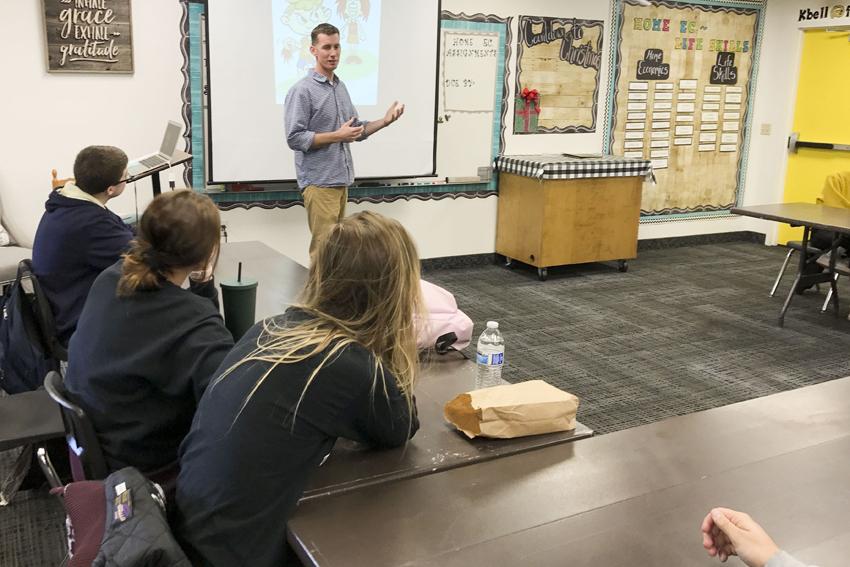
Dave Obwald speaks to students about resolving issues

Apart from learning practical skills such as cooking and financing, home economics teacher Kimberly Bell also teaches her students life skills. One such skill she is instilling in her students is how to deal with conflict.
Bell invited special guest speaker Dave Obwald to speak to her students about the different issues struggles creates, Nov. 27-30. Obwald is a current pastor at The Well and has a masters in conflict and peacemaking studies.
Obwald believes high school students should learn to deal with conflict at a young age because it is something they will constantly see in their lives, no matter their age.
“I think every high school student is a part of some family unit that is conflicted in some way,” Obwald said. “At Fresno Christian, we talk about becoming world changers, and for us to be a part of change in our world, we’re always going to face conflict. Most students here are going to get married, have kids or be a part of jobs. Everyday I’m working with people who have conflicts with their jobs and with their homes and most people aren’t equipped to deal with that.”
Bell invited Obwald to speak to her students because she knows the skills he taught them are useful for any age group.
“I hope they learn how to recognize their role in conflict when it arises, know how they naturally respond and learn new ways to deal with it,” Bell said. “They are going to deal with conflict for the rest of their lives. They’re going to have all kinds of relationships that are going to require working through struggles.”
Obwald believes giving people the right ‘tools’ they need to deal with conflict will help them in all areas of life. According to Obwald, conflict will never resolve itself, but rather needs to be worked out by the people who started it.
If I can leave some high school students with tools to seek conflict in a restorative way as God does and equipped to help others in that, I believe that’s what starts to change the world around us. The simple advice is, God always says to start with looking at our part first. The next step is to seek mutual understanding rather than assigning blame immediately, but it’s hard because most of us are really scared to deal with the conflicts we are a part of. — Dave Obwald
One of the first things to do when dealing with conflict is to examine yourself. Obwald advises people to first seek a resolution in the early stages of a conflict, as it becomes more difficult to deal with as time goes on.

“If I can leave some high school students with tools to seek conflict in a restorative way as God does and equipped to help others in that, I believe that’s what starts to change the world around us,” Obwald said. “The simple advice is, God always says to start with looking at our part first. The next step is to seek mutual understanding rather than assigning blame immediately, but it’s hard because most of us are really scared to deal with the conflicts we are a part of. We end up just wanting to win an argument versus taking the time to resolve it.”
Senior Erin Wilson took home ec. as a freshman, but decided to take the class again after learning Bell (who took over after Sharon Scharf retired) changed things about the class.
“I learned that when you are in a conflict with someone, it’s important to catch it early and just confront it right away before it starts building up tension and it eventually explodes,” Wilson said. “I think it (Obwald’s lecture) will help because now I’m aware of the cycle that conflict will go through and also I think I will be able to notice it more in my life. I really do think it will help because conflict is so common and it’s going to happen no matter where you go and what you do, so I think it’s really helpful to learn about it now.”
Obwald describes conflict as a “block” that separates people from a solution. He emphasized the point that people cannot control others in a conflict, but rather can only control their own actions. Obwald believes the lense one takes on conflict matters, as everyone sees each situation from a unique viewpoint.
Bell will continue to invite guest speakers to the class throughout the year. Pastor Chris Schultz will speak to the class in February about love languages and topics related to emotions.
For more articles, read: Staff, students share benefits of bilingualism or Let’s Talk: Depression.
This author can be reached via email: [email protected].